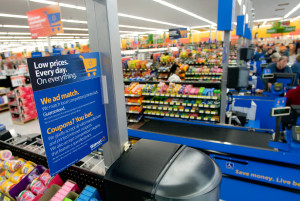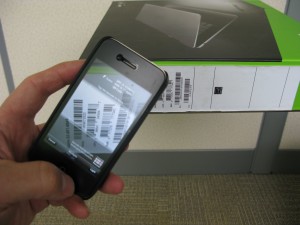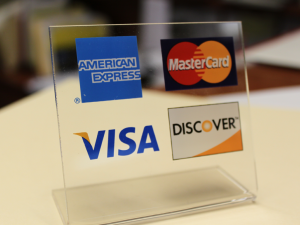December 30th, 2013 by Elma Jane
MasterCard and Green Dot today announced an expanded relationship that allows all U.S. cardholders with MasterCard rePower -enabled prepaid cards to reload their cards via the Walmart Rapid Reload service.
Walmart Rapid Reload utilizes the Green Dot Network to provide cardholders with a fast and easy way to load funds directly to their cards by swiping their cards at any register at participating Walmart stores (not available in VT or WY). Cardholders can add funds directly to their prepaid account by using cash or a pre-printed payroll or government check. Cashier-added funds will be available for use by MasterCard rePower-enabled cardholders within minutes.
The MasterCard rePower network is open to any MasterCard issuer of reloadable prepaid card programs. Portfolios such as the Univision MasterCard Prepaid Card will be able to offer their cardholders the new cash reload option through Walmart Rapid Reload.
Prepaid products provide consumers with choices in how they manage and spend their money. In order to maximize the potential of prepaid, cardholders need to be able to conveniently and securely reload funds. Our expanded partnership with Green Dot now allows our cardholders to load funds to their prepaid cards at more than 4,000 Walmart stores that offer Walmart’s Rapid Reload service, said MasterCard Group Executive of U.S. Market Development Craig Vosburg.
Posted in Credit card Processing, Electronic Payments, Gift & Loyalty Card Processing, Visa MasterCard American Express Tagged with: cardholders, green dot, MasterCard, network, pre-printed, prepaid cards, rapid reload, register, reloadable, repower, securely, Swiping, univision, walmart
October 18th, 2013 by Elma Jane
All Alerts, All The Time
Will mobile payment apps hail the arrival of mobile interruptions that never let up? Consumers worry that adopting a mobile wallet app will open them up to a barrage of alerts, sounding the alarm every time the local supermarket has toilet paper for half-off. The services can even track your purchases, opening the floodgates for targeted ads. Frequent alerts could be a deal breaker.
Battery Woes
As smartphones gets bigger, badder and more powerful, battery technology is struggling to keep up. That’s a problem if you want to make a call — but it could be an emergency if your smartphone is your wallet, too. Users are already scrambling to find a charging outlet by lunchtime. Soon, failure to recharge might mean you lack the funds to buy lunch in the first place. Meanwhile, credit cards never need a battery boost, and paper money has worked faithfully since well before the invention of the light bulb.
Do I Have The Right Phone?
You’re ready to make a mobile payment — but is your smartphone? Only the most popular new Android and Windows smartphones have NFC support to enable tap-to-pay services, and Apple has decided to forgo NFC altogether with its iPhone handsets. Users of budget smartphones are likewise out of luck. And though smartphones may seem ubiquitous, only a little more than half of U.S. adults have one.
Is It Secure?
Mobile payments open up a whole new frontier for fraudsters — or so cautious consumers worry. In fact, tap-to-pay technology is as secure as swiping a plastic bank card, and cloud services like PayPal Here support two-factor authentication for extra reassurance. Still, consumers worry their personal information could be intercepted during a transaction, and not everyone is convinced that Google can provide the same level of protection as their bank. But hope remains. The survey found about half of the most security-conscious respondents were much more likely to be interested in mobile payment options if they could be promised 100 percent fraud protection.
Limits, Limits, Limits
Even with a glut of mobile payment options, most lack at least one critical feature. Google’s Wallet app lets you stow your payment information in your phone to buy items in brick-and-mortar shops, but its touch-to-pay functionality is limited to Android devices on Sprint and other smaller carriers. Last year, Apple introduced Passbook, a mobile wallet app that lets users store gift card credits, loyalty card information and more on their iPhones — but only a handful of participating businesses support the app. The mobile payment model isn’t just fragmented — it’s fundamentally limited by countless companies competing for an ever-smaller piece of the pie.
Mobile What?
A recent CMB Consumer Pulse survey showed about half of smartphone users have never even heard of mobile payments. And of the 50 percent who have, a meager 8 percent said they’re familiar with the technology. Banks, credit card companies and others hoping to cash in on consumer interest will have to invest in better messaging first.
What Are The Perks?
Credit cards come with alluring perks — signing bonuses, cash back and travel accommodations, to name a few. But mobile payment systems have serious benefits. They can utilize GPS technology to direct you to deals, keep tabs on your bank account to alert you when you’re near your spending limit, and store unlimited receipts straight to the cloud. Businesses profit from mobile wallets, too, which often charge lower fees than credit card companies and encourage return trips by storing digital copies of loyalty cards.
What’s In It For Me?
To convince consumers to abandon trusted payment options for something new, companies must strike an undeniable value proposition. In the late ‘90s, electronic retail giants like Amazon compelled consumers to enter their 16-digit credit card numbers into online portals, opening up a whole new world of convenience with online shopping. But today’s consumers aren’t convinced that mobile wallets are any more convenient than their physical counterparts. Credit and debit cards already offer a speedy, reliable way to pay on the go. And since they’re accepted virtually everywhere, customers can fork over a card without worry or confusion. Convincing people that new technology is worth their time and effort might ultimately be the toughest nut to crack for mobile payment purveyors.
Where’s The Support?
Even the most enthusiastic adopters are out of luck if their favorite shops lack the infrastructure to process mobile payments. Big-box retailers sprang up in the infancy of computer technology, so joining the mobile payment revolution could necessitate updates to check out hardware and software. Mobile payments could be a boon to businesses, but installing the upgrades could be expensive and disruptive — especially when consumer interest remains low.
Which to Pick?
Even curious consumers are confounded by the array of mobile payment options available. Google, Visa, MasterCard and even mobile carriers like Sprint and Verizon are among the heavy hitters on the mobile payment scene, each offering a discrete service with different apps — and different rules. Some rely on Near Field Communication (NFC) technology that lets users simply tap their smartphone against a special reader to pay, while others offer up scannable QR codes. Mobile payments may never take off until one company rises above the rest with a single killer service.
Forget about cash or credit. In 2013, consumers can simply swipe or scan their smartphones at the checkout to pay. A huge array of mobile payment services have sprung up in recent years, urging customers to abandon their plastic credit cards for the “mobile wallet” revolution, but so far, adoption of mobile payment technology has been dismal.
Posted in e-commerce & m-commerce, Electronic Payments, Gift & Loyalty Card Processing, Internet Payment Gateway, Mobile Payments, Mobile Point of Sale, Near Field Communication, Smartphone Tagged with: alerts, Android, Apple, bank card, battery, cautious, consumers, crack, credit cards, deal, digital, fraud, gift card credits, google, GPS, information, Iphone, lower fees, loyalty cards, mobile, nfc, online, options, paper money, Passbook, payment, PayPal, personal, phone, plastic, portals, powerful, protection, purchases, secure, Smartphones, sprint, storing, support, Swiping, Tap to Pay, touch-to-pay, track, two-factor authentication, wallet, windows
October 3rd, 2013 by Elma Jane
National Transaction Gift Card Programs
Features & Benefits
Why National Transaction Gift Card? A gift card program offers you a great opportunity to boost sales by increasing customer loyalty and enhancing your business brand. Gift cards are used like credit cards and can be loaded with any dollar amount. NTC offers customized gift card processing merchant services tailored to your gift card processing needs. It’s secured and easy to manage.
Benefits to Consider:
Brand Building and Loyalty Gift cards can be a great source of advertising for your business. Gift cards are re-loadable; customers often reload them and continue to use them.
Cash Flow Enhancement Prepaid gift cards are purchased prior to customers receiving their goods and services from you. You can re-invest these dollars back into your business. Earn money; research shows that customers tend to spend more than the value of the gift card.
Easy to Manage Merchant gift cards are easy for your customers to use and easy for your employees to issue and redeem, as they work similar to credit cards.
Eliminate or Remove Cashback Don’t have to use the full balance of the card – the balance remains on the card. It can be issued for returned merchandise, thereby reducing fraud. Gift cards can only be activated by swiping through a POS terminal.
Get and Bring New Customers Using gift cards as presents (e.g. Showers, Mother’s Day, Birthdays, Graduation and Christmas) is more popular than ever before. Offering a gift card program can help bring new customers to your business, thereby increasing sales.
Increasing Brand Awareness Gift cards customized with your business name or logo are an effective way to advertise your business and leave a lasting impression with customers.
Electronic gift card vs paper certificates? An electronic gift card solution provides a number of benefits over certificates, such as:
Minimize Fraud – card are difficult to duplicate while paper certificates can be photocopies or duplicated. Save Money – cards can be reloaded. Paper certificates can only be used once. Save Time and Maximize Efficiency – gift cards can be loaded and redeemed easily, and provide electronic reporting. Paper certificates require manual work.
NTC Gift Card Operations How does a Gift Card work? Cards are activated through your NTC merchant account with a dollar value requested by your customer and not dependent on things like proprietary equipment. Once the card is activated, it’s ready to use as payment at your location.
Are my Gift Cards reloadable? Yes, and may be reloaded as many times as you wish. You may consider offering an incentive to thank your customers for their loyalty. Incentives can range from providing a free product or service from your store.
What NTC Merchant Services terminals do I need to process NTC Gift Cards?
Your NTC Gift Card will function on any Standalone, Wireless and Bluetooth terminals.
Card Ordering/Design
What is the standard gift card size? Most gift cards are the exact same size as a credit card:
What options do I have to advertise my business name on my cards?
To help promote and advertise your business brand on your cards, you can choose one of these options:
Basic – Include your company’s name, address and phone number on a pre-selected style. Standard – You can choose from an attractive selection of pre-designed card styles. Add a single color logo or customized text in your choice of font style and color.
Custom Cards – Custom cards designed by you or with our help, invest with style.
How long does it take for me to be set-up and receive my gift cards?
Your application and set-up on NTC systems will take approximately 5 – 7 business days. Non-peak times (outside Christmas) – 2 weeks Peak times – 4 to 6 weeks
How many cards I can order? Quantities of 50 for Basic, 100, 1,000 for Standard.
Posted in Best Practices for Merchants, Electronic Payments, Gift & Loyalty Card Processing, Merchant Services Account Tagged with: advertising, bluetooth, certificates, credit cards, earn, electronic, function, gift, gift Card, loyalty, merchant account, ntc, payment, POS, Processing, re-loadable, reload, reporting, secured, standalone, Swiping, terminal, terminals, value, wireless
September 30th, 2013 by Admin
Credit card processing involves three separate cost components for vendors who choose to accept this type of payment from customers for goods or services. The same cost components apply to debit cards. Only one cost component is negotiable.
The first component is an interchange fee, which is payable to the card holder’s issuing bank. It is a combination of a transaction volume percentage fee and a flat-rate transaction fee. Interchange fees are collectively agreed upon through Visa and MasterCard by a card’s issuing bank and are fixed costs.
Interchange fees take into consideration various information about a card. Types of cards include debit and credit, while categories of cards refer to commercial and reward cards. Processing methods include whether a card is swiped or manually keyed. Swiping a card is usually more economical for vendors.
Secondly, an assessment fee is charged by the card’s brand holder. Brand holders include Visa, MasterCard and Discover. Assessment fees are also fixed costs. Additionally, Visa charges a monthly fee.
The final charge is known as a processing fee. Processing fees vary among processors and is negotiable. Vendors are charged a processing fee, which can cause a difference in cost from one vendor to another. More credit card information: TopTenReviews
Jeremy is a tech blogger at TopTenReviews. He lives outside Salt Lake City, Utah
Posted in Best Practices for Merchants, Credit card Processing, Electronic Payments, Merchant Services Account, Visa MasterCard American Express Tagged with: accept, assessment, cost, credit card processing, debit cards, fees, flat-rate, interchange, keyed, payment, Processing, Rates, swiped, Swiping, transaction, volume
At the heart of mobile payments is persona. In a cash based humanity, persona isn’t a very big anxiety as everyone’s money is the same. But if you are going to be swiping, scanning, or only signalling to the Starbucks barrista as she agrees your picture to your face, your persona is the critical enabler to making the entire design work.
So it might be a good idea to gaze at the concept of persona a little more nearly. Identity habitually arises as a part of a structure intended to permit the identifier some kind of rights and privileges while defending the interests of the identifying party. The outcome of this need is some kind of identification, which could be a borrowing card, passport or driver’s license, or a myriad of alike things. Read more of this article »
Posted in Mobile Payments Tagged with: Commitment Cards, credit cards, Iphone, Mobile Payments, Scanning, Swiping



